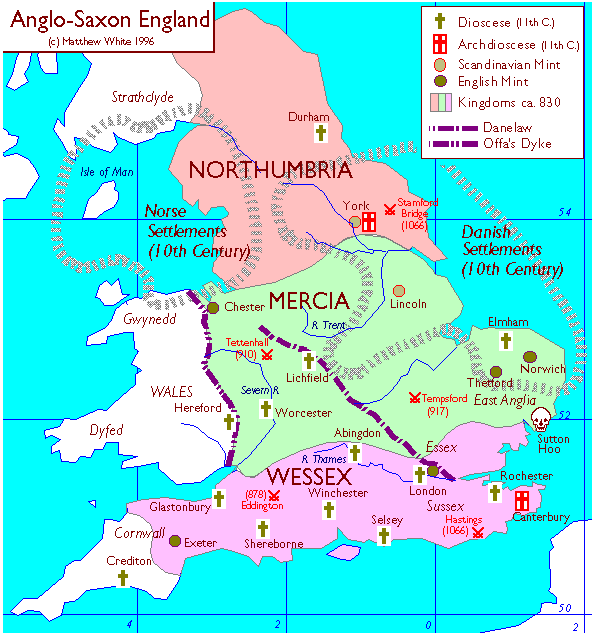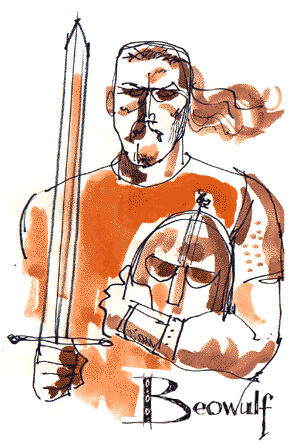The Anglo-Saxon Period

| Overview of the Anglo-Saxons | Introduction to Anglo-Saxon literature | Authors of the Anglo-Saxon period & their works |
To the east of present day Great Britain remains the coast of the European mainland. This area was inhabited by groups of Germanic tribes, of which included the Angles, Saxons, and the Jutes. They were an energetic warriors and accomplished seamen, but their native land was arid and quite vulnerable to constant flooding from the North Sea. By 441, groups of Angles, Saxons, and Jutes had already begun to scatter throughout eastern, central, and southern Britain. The lives of these Germanic settlers can be characterized as being tribal, insecure, unmerciful, and dangerous. In this warrior society, loyalty was honored by prestigious awards and wealth. During the forty years after the arrival of St.Augustine at Britain, Anglo-Saxon kings and their people began adopting the religion of Christianity. The Church had a profound effect on the development of Anglo-Saxon culture. It taught the Anglo-Saxon how to read and write. Between 867 and 877, the Vikings invaded England and conquered virtually all of northeast and central regions of England. The region fell under Dane law rather than Anglo-Saxon law that had been enforced for hundreds of years. The Anglo-Saxons ruled England for over 600 years and now are acknowledged as the first "Englishmen".
Introduction to Anglo-Saxon literature
Anglo Saxon literature refers to literary writings in Old English dating back from 650 A.D. to 1150 A.D. Old English poetry can be categorized as being heroic (Germanic myths & custom) or Christian. Virtually all of what's left of Anglo-Saxon literature is contained in only four manuscripts. Known scops orally passed down old stories to future generations. Furthermore, Old English poetry is most definitely the earliest source of Germanic literature. Because of that, it is the closest that modern society can come to an "oral pagan literature" of Germanic culture and also the most vital source of knowledge of many aspects of Germanic culture.
Authors of the Anglo-Saxon period & their works
Poetry
The 7th-century work known as Widsth is one of the oldest and earliest Old English poems
known to scholars today and hence, it serves as a historical and
linguistic interests.

Beowulf, a complete epic, is the first chef-d'oeuvre (masterpiece) in English literature and the oldest and longest surviving Germanic epic as well. This makes it the most important poem in Old English literature. The story of Beowulf came about as a heathen saga handed down orally from one generation to the next. The version of Beowulf that is present today was composed by a Christian poet, probably in the beginning of the eighth century. The periodical Christian themes in Beowulf, however, are not connected with the overall pagan tale. Beowulf is inherently a part of the Anglo-Saxon culture. It is about a hero's courageous and bloody struggle monsters and glorifies the virtues of courage, honor, and loyalty in a brutal world. An underlying feeling in Beowulf is significant in many poems including Deor, The Wanderer, and The Seafarer. These works like many other of the time has a theme that contrasts between a joyful past with a doubtful and a cheerless present. Other poetic works at the time, which were anonymous, all emphasize that greatness is measured by unconditional loyalty and courage instead of just victory.

Adventures of Beowulf - a serialized adaptation from the Old English version by Dr. David Breeden.
Prose
Old English prose dates back to the latter part of the Anglo-Saxon period. Prose was originally written in Latin before the ascension of King Alfred, who worked to revive English culture after the Danish invasions. Hardly anyone knew how to read Latin texts at the time, King Alfred worked to translate the most important Latin texts to "english". Besides doing the hard work for his country, he also promoted prose writings in the vernacular, didactic, devotional, and the informative. One of the most informative works was the Anglo-Saxon Chronicle. A historical record, the Anglo-Saxon Chronicle was probably started in the during King Alfred's time. The two chief writers of prose AElfric, Abbot of Eynsham, and Wulfstan, Archbishop of York. A large portion of Latin poetry and prose was written during the Anglo-Saxon period.
 Alfred the Great
Alfred the Great 